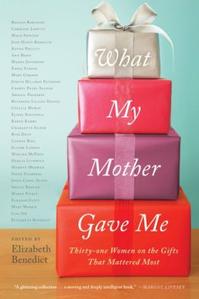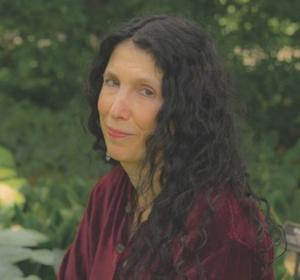
We talked to two authors featured in the book, Karen Karbo (the present of an etiquette book) and Caroline Leavitt (an old photograph), about the gifts of mothers.
Most of the gifts in these essays were modest. Is there a common denominator to the resonance that these gifts have that isn't present in, say, a BMW or the wedding of one's dreams?
Caroline Leavitt: I think it really has to do with the deeper meaning of the gift. My mother is usually pretty close-mouthed, and for her to give me not only a photograph that shows her struggling, but to open up and tell me the story of those days, bonded us in a way that nothing else had before. (And she's given me some spectacular and expensive gifts in the past!) I knew that she wasn't just letting me see the "real" her, so to speak, but she was trusting me with information about her own past that hurt her. I saw it as the ultimate act of love.

|
|
| Karen Karbo | |
Karen Karbo: Practically speaking, I don't think most of our mothers were in a position to buy us BMWs! My mother, who was a housewife, surely wasn't. Also, it seems like the presents you suggested belong firmly in the realm of father's present to a daughter: the lavish grand gesture, something that costs a lot, compensating for the time he hasn't spent with her and expresses the degree to which he worships her. Mothers give their entire lives to their children; what else is there to give, really? I also think that mothers, especially with daughters, often find themselves in an instructional frame of mind. As fellow females, mothers know what daughters will be up against in the big wide world. Modest presents generally reflect reality; lavish presents reinforce the "I'm a princess" fantasy, something which most moms know isn't close to anything resembling the reality.
Often the recalling of the gift brings about a realization about a mother's life that wasn't noticed when the recipient was younger.
CL: Oh, absolutely. When I was younger, I didn't get why my mother was often cranky or sad. I just thought she was moody or mad at me. Giving me the photograph made me realize how rough her life had been and how hard she struggled to pretend that everything was fine. It made me realize that telling the truth about a rough time is far better than pretending everything is going well.
 |
|
| Carolyn Leavitt | |
KK: Or, perhaps we daughters simply chose to write about presents that helped us better understand those unfathomable beings known as our mothers. My own mother, who died when I was 17, is still an enormous, unknowable force in my life. My essay concerns an etiquette book, White Gloves and Party Manners, that she gave me for Easter the year I turned 11. I still have the book and over the decades my realizations about my mother keep morphing into further realizations.
How can these gifts heal mother-daughter wounds later in life?
CL: Any time anyone lets you really see who they are, it offers up real understanding. I began to understand things my mother had done in the past in a new way. Gifts are tangible evidence that you care enough to try to bridge a gap, or heal a hurt.
KK: By urging us--forcing us?--to see our mothers as the complex, three-dimensional people they are and were, and not just the fun-killer who wouldn't let us wear that outfit to junior high.
Is there a way for mothers now to figure out how to make a gift to their daughter meaningful, or is it a random act that can only be seen as valuable later?
CL: Again, I'd say, give something that really matters to you, that reveals who you really are. Or give a gift that shows that you know, or want to know, who your daughter really is.
KK: A gift that expresses both who you are and who honors who she is, is one worth giving, and meaningful in a good way. Gifts that are meaningful, but not positive, are like the one my mother gave me, which was a present meant to help transform me into someone better (or at least with better manners). Although I'm sure it was given in a spirit of love, White Gloves and Party Manners only served to communicate to me my mother's life long belief in the power of self-transformation. She was a beautiful woman, a tremendous flirt and conversationalist, and she used these gifts to snag my dad, which catapulted her from her life as an illegitimate daughter of the Irish working class to the wife of an educated upper middle class professional. Her hope for me was that I could marry even higher up, to someone more educated, more accomplished and richer, and her present communicated this. It had a great deal of meaning, but the ramifications were complex. Perhaps the complexity is what gave it meaning.
Rita Dove's story is not about a tangible gift, but the gift of a mother allowing her child to make a decision and go her own way. There are so many intangibles that we so often forget about or have nothing to jog our memory. How could we think about those gifts and remind ourselves as well as we do with a china cup or a jade necklace?
CL: Ha! This made me laugh! But I think our memories of the event work on us and remind us in deeper ways what's most important--which, to me, is human connection. I was so much more deeply affected by what my mother said about the only childhood photograph of her than I was by the photograph itself (though the photo is pretty amazing.)
KK: That's an excellent point. Despite my still-conflicted feelings about my mother, there are things she gave to me--or perhaps taught me is a better word--for which I remain grateful. My mother showed me how to talk to other people, and also how to enjoy myself. She loved a good time and modeled for how to find humor in most situations. She was a great friend to her friends, and taught me how to be one too. (Right, friends? Maybe they would disagree!) Whenever I do anything specifically related to having fun, talking to strangers, or being there for my friends, I remember her.
Has your mother given you any other gift since then that was as meaningful?
CL: Yup. After a terrible marriage and a young widowhood filled with anger and resentment toward and around men, my mother went to live in a retirement community, where she managed to fall in love for the first time at 90, and they are still going strong. To me, that's a gift that says that people can change, that life can hold lovely surprises, that love is always possible. --Marilyn Dahl, editor, Shelf Awareness for Readers
Karen Karbo's first novel, Trespassers Welcome Here, was a New York Times Notable Book of the Year and a Village Voice Top Ten Book of the Year. Her other two adult novels, The Diamond Lane and Motherhood Made a Man Out of Me, were also New York Times Notable Books. Karbo is best known for her Kick Ass Women series, the most recent of which is How Georgia Became O'Keeffe, published in 2011. Next up: Julia Child Rules (skirt!, October 2013).
Caroline Leavitt is the author of nine novels, including Pictures of You, which was a San Francisco Chronicle Lit Pick and a Costco Pennie's Pick, and was on several Best Books of 2011 lists. A book critic for the Boston Globe and People, Leavitt is a senior writing instructor at UCLA online. Her latest book is Is This Tomorrow? (Algonquin, May 7, 2013).

